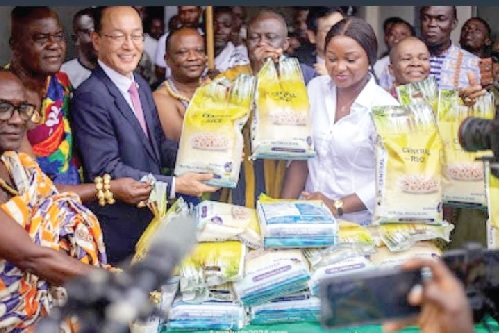
Central Region unveils its rice brand
After years of efforts, technical training and collaborations, the Central Agra Rice has been launched.
The launch of the highly nutritious rice, locally grown, milled and packaged by cooperative rice farmers in the Central Region, marks a milestone towards food security in the region and the country.
Last Wednesday, the rice milling factory was inaugurated at Assin Akropong in the Assin Fosu Municipality of the Central Region to support the production of the rice.
The project, to be managed by the Central Regional Rice Cooperative Union, is to help ensure food security and boost the income of rice farmers.
The factory represents the culmination of a four-year bilateral cooperation between the Korean government, through the Korea International Cooperation Agency (KOICA) and the Ministry of Food and Agriculture (MoFA).

With a production capacity of 10,000 tonnes per annum, the factory is expected to boost Ghana’s rice output, alignitng with the government’s goal of achieving national self-sufficiency in rice production.
The factory will mill rice from farmers from five beneficiary districts under the RVCI project, namely Gomoa East, Assin Fosu, Assin North, Assin South and Twifo Atti-Morkwa.
The Minister of Food and Agriculture, Dr Brian Acheampong, said the factory had demonstrated the power of international cooperation in achieving development goals.
“We are committed to ensuring that this project benefits our farmers, processors and consumers, and contributes to the growth of our economy,” he added.
Poverty eradication
The Central Regional Minister, Justina Marigold Assan, stated that rice had for some years now become an integral part of our daily cuisine, adding that not only was it a staple food but also a symbol of nourishment and an avenue for poverty eradication in the region.
She stated that with the implementation of the KOICA Rice Value Chain Improvement Project, the region had seen remarkable improvement and increase in rice production, as well as the average yield per hectare of rice farms.
"We have indeed seen an increase in rice production from 16,246 metric tonnes in 2021 to 21,430 metric tonnes in 2023, which is an increase in average yields from 3.37 tonnes per hectare in 2021 to 4.17 tonnes per hectare in 2023," she added.
Mrs Assan said even though the region had chalked up some successes, there was still more to be done.

"The challenge, however, has got to do with land development issues. About 95 per cent of our rice fields are not properly developed for rice production and this accounts for our inability to achieve our maximum targeted yields of at least five metric tonnes per hectare," she explained.
The Central Regional Minister said the region could boast of about 24,641.8 hectares of potential rice fields which still remain untapped, and appealed for more interventions from development partners and the MoFA to support the region with technical and technological know-how to be able to develop untapped lands for production.
New dawn, new era
Mrs Assan said the inauguration of the mill did not only signify the birth of a new business, but also the dawn of a new era in the region's agricultural industry. I must admit that the journey to the realisation of the completion of this project has not been easy.
"Let us remember that success is not only measured by profits, but also by the positive impact we create in the lives of our people and the environment. Let us strive to uphold the highest standards of ethical business practices, environmental sustainability, and social responsibility for the benefit of all and sundry," she added.
She urged Ghanaians to patronise the healthy nutritious rice, to improve the lives of farmers and the economic fortunes of the region.

In his remarks, the Korean Ambassador to Ghana, Park Kyongsig, said the rice mill would serve as a hub of high-quality rice production, substantially improving rice quality and boosting farmers' incomes in the Central Region and the country as a whole.
Additionally, he said the launch of the 'Central Agra Rice' brand would further enhance the productivity of smallholder farmers and add value to their produce.
The Korean experience
He stated that Korea had experienced significant agricultural advancements through innovation, since the latter half of the 20th century, particularly the 'Saemaul Undong' (New Village Movement) in the 1970s which greatly enhanced agricultural productivity.
As a result, he said Korea's rice self-sufficiency rate, which was around 60 per cent in the early 1970s, surpassed 100 per cent in the early 1980s.
He said these achievements were made possible through the combined efforts of its farmers and government support, leading to continuous progress in Korean agriculture.
"Agriculture is not merely about food production; it is a critical foundation for a nation's economy. When agriculture prospers, the quality of life for farmers improves, which in turn drives the overall development of the country," he stated.
He said the handing over of the mill reaffirmed the importance of agriculture and provided an opportunity to further strengthen the cooperation between the two nations.
The Chairman of the Central Regional Rice Cooperative Union at Assin Akropong, James Kuranchi, said the de-stoning feature of the mill would add value to the previous technology used in milling and thanked the Central Regional Coordinating Council in particular and the Korean government for the support.
He explained that the facility would be fully handed over to the union after a month's test runs with engineers.
He also appealed for financial support to purchase the rice from farmers and for milling.
